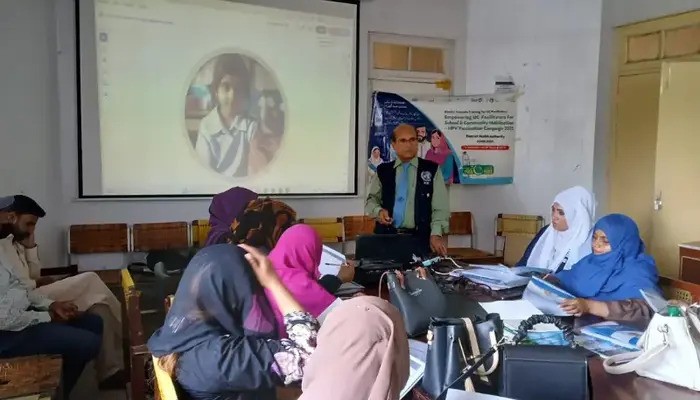
Pakistan is preparing for its first nationwide HPV vaccination campaign, with media playing a central role in creating awareness and addressing misinformation. The HPV vaccine, recognized globally for its life-saving potential, will soon be offered to girls aged 9 to 14 across selected regions. Ahead of the campaign, the DOPASI Foundation gathered senior journalists in Islamabad to stress the need for accurate reporting and public engagement.
Media as a Partner in Public Health
During a roundtable on Tuesday, health experts highlighted that the success of the HPV vaccination drive depends not only on logistics but also on public trust. They urged journalists to use their platforms responsibly to explain the importance of vaccination. Myths and misinformation, they warned, remain one of the biggest threats to vaccine acceptance.
Representatives from the World Health Organization (WHO), the Society of Obstetricians and Gynecologists of Pakistan, and the Islamabad Health Department participated in the dialogue. They encouraged media professionals to stand as allies in spreading reliable information and countering false narratives.
Campaign Timelines and Coverage
The national campaign is scheduled to run from September 15 to 27, 2025. It will initially cover Sindh, Punjab, Azad Jammu and Kashmir (AJK), and Islamabad. Organizers said the campaign would serve as the foundation for introducing HPV vaccination into Pakistan’s routine immunization program.
By starting with a targeted drive, the government aims to build awareness, strengthen acceptance, and prepare systems for long-term implementation. If successful, the initiative will extend nationwide in the coming years.
Pakistan Joins Global Effort
With this campaign, Pakistan becomes the 150th country to introduce HPV vaccination at the national level. Globally, the vaccine has proven effective in preventing cervical cancer, one of the leading causes of cancer-related deaths among women. Officials underscored that Pakistan’s step marks an important milestone in the fight against preventable diseases.
They also emphasized that joining this global health effort demonstrates Pakistan’s commitment to women’s health and its willingness to align with international best practices in immunization.
Read: The Carnivore Diet: What Science Actually Says About This All-Meat Approach
Addressing Myths and Misconceptions
Health experts acknowledged that myths surrounding vaccines often spread faster than facts, particularly on social media. Concerns about side effects, religious acceptability, and false claims of infertility were cited as common misconceptions.
WHO representatives explained that the HPV vaccine is safe, effective, and widely recommended. Millions of girls worldwide have already received it without major health concerns. The challenge in Pakistan, they said, lies not in science but in public perception.
Journalists at the session agreed to play their part in clearing doubts by providing balanced coverage. They committed to amplifying the voices of doctors, health officials, and global experts who can reassure communities about the vaccine’s safety.
Life-Saving Potential of HPV Vaccine
Experts highlighted that cervical cancer claims thousands of lives annually in Pakistan. The HPV vaccine can prevent most of these cases. Early immunization of girls between 9 and 14 years offers the strongest protection, as the vaccine works best before exposure to the virus.
By targeting this age group, the campaign aims to shield future generations from a disease that is otherwise difficult to detect until it reaches advanced stages.
Coordination Among Stakeholders
The roundtable also underscored the importance of collaboration. The DOPASI Foundation, WHO, provincial health departments, and professional medical associations are jointly working to ensure the campaign’s success. Local health workers will carry out vaccinations, while schools and community organizations will be mobilized to encourage participation.
Officials explained that integration into routine immunization will ensure sustainability. Once established, the vaccine will become part of the regular schedule for children, similar to other essential vaccines.
Journalists’ Role in Public Outreach
Participants stressed that journalists have the power to shape how families perceive the HPV vaccine. A well-informed media can encourage parents to allow their daughters to be vaccinated, while irresponsible reporting could fuel hesitation.
By attending the roundtable, media professionals acknowledged their role in protecting public health. They pledged to report with accuracy, empathy, and responsibility, knowing their words could influence health decisions across communities.
Toward a Healthier Future
The HPV vaccination campaign is more than just another health initiative. It represents a shift toward prevention and long-term protection against life-threatening diseases. With active media support, robust health infrastructure, and international collaboration, Pakistan has the chance to save thousands of lives.
The campaign also sets an example for tackling other health challenges. By combining scientific expertise with strong public communication, the country can overcome barriers of fear and misinformation.
As September approaches, all eyes are on the success of this first national HPV vaccination drive. For Pakistan, this is not only a public health campaign but also a test of collective will, cooperation, and the power of informed awareness.
Follow us on Instagram, YouTube, Facebook,, X and TikTok for latest updates
